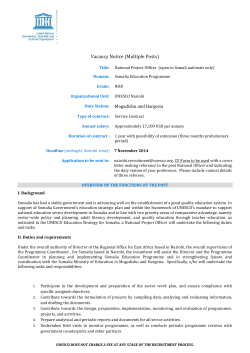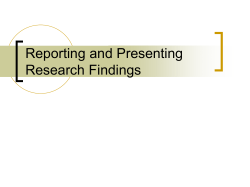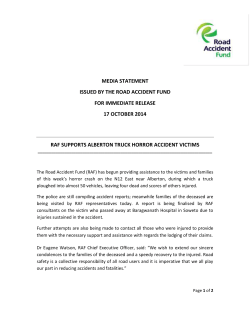
MINUTES ARISING FROM THE INDEPENDENT CHIEF INSPECTOR OF BORDERS
MINUTES ARISING FROM THE INDEPENDENT CHIEF INSPECTOR OF BORDERS AND IMMIGRATION, INDEPENDENT ADVISORY GROUP ON COUNTRY INFORMATION (IAGCI) ON 25TH JUNE 2014 Venue: 5th Floor, Globe House 89 Eccleston Square London, SW1V 1PN Present: Members Laura Hammond (Chair) (LH) Ceri Oeppen (CO) Patricia Daley(PD) Michael Collyer (MC) - School of Oriental & African Studies - University of Sussex - University of Oxford - University of Sussex Representatives from ICIUKBA John Vine (for item 8 only) - Independent Chief Inspector‟s office Stuart Harwood (SH) - Independent Chief Inspector‟s office Charmaine Figueira (Secretary) - Independent Chief Inspector‟s office (CF) Representatives from CPIT Martin Stares (MS) Robin Titchener (RT) Andrew Saunders (AS) Jacqueline Niven (HO) Amanda Wood (HO) - Home Office - Home Office - Home Office - Home Office - Home Office Commissioned reviewers Ben Parker (BP) Zuhura Mahamed (ZM) Claire Beaugrand (CB) Oliver Phillips (OP) - Somalia - Somalia - Kuwait - Zimbabwe Observers from FCO Heidi Minshall (HM) Jamie Hamill (JH) - FCO - FCO Apologies: 1 Andrew Jordan (AJ) Blanche Tax (BT) Harriet Short (HS) Elena Fiddian-Qasmiyeh (EFQ) - First Tier Tribunal - UNHCR (Geneva) - ILPA - University of Oxford Agenda Item Issue Action point Introduction and welcome The chair welcomed everyone to the Chief Inspector‟s Independent Advisory Group on Country Information. 1. Introduction LH welcomed MS, the new head of Country of Martin Stares, update Policy Information Team (CPIT), to the meeting. on Heaven MS explained that the new team brought Crawley together the work of both COIS and CSLU in one place. Roseanna Atherton is no longer involved in the work of the unit. LH informed the panel that Heaven Crawley (HC) had stepped down as a member of the panel as she had not been able to attend any of the meetings so far due to other commitments. LH asked the panel if HC should be replaced or should the panel operate with a reduced membership. CO and MC agreed that it would be best to recruit another member of the panel. Possibly advertise the post. 2. Minutes of last meeting The minutes of the meeting held on 20/01/14 were agreed. 3. IAGCI LH introduced BP and ZM the commissioned Commissioned reviewers for the report on Somalia. Reviews: Somalia LH took the decision to use two reviewers on Somalia. Using BP, until recently Head of Communications for the UN in Somalia, to do the full review and ZM to focus on the sections on psychosocial issues and gender. BP presented his findings. He found the document to be quite repetitive. He was not 2 1. Panel members to propose potential candidates to LH for consideration for membership. sure why some sources were given higher priority over others. The sources need to be rebalanced. The cut off date of the report did not allow for some sources which would be of benefit to the user. The date also meant that more recent, highly relevant information about unrest in Somalia was not included. 1. RT said that it was a challenge to keep up with the changes. Certain topics could be updated more frequently as the new product moves forward. It was also a challenge to obtain information on cities other than Mogadishu. BP highlighted that the word „Famine‟ was used loosely in the report, when in fact there are very tight definitions of “famine” used by aid agencies and governments. He advised that whilst there were severe food shortages in parts of South Central Somalia currently, famine was only declared in 4 districts in 2011, and that those districts have been upgraded since (although they are still in most cases highly food insecure), and the word should not be used where it has not been officially designated as famineaffected. BP challenged the repeated use of the term “Peacekeeping” to describe the work being done by the African Union troops (together with the Somali National Army). He said that there is no peace to keep, and that they are undertaking „peace enforcement‟. He wanted to know what would happen to the recommendations that he had made and challenged some of the non-committal language used by CPIT in their responses. LH agreed and commented that, as a result of previous criticism from IAGCI, COIS had been providing responses that were much clearer and committal but she was disappointed to see the reappearance of such non-committal comments. JN explained that she didn‟t realise she needed to respond to all recommendations, and had seen them more as suggestions. She will amend that. LH pointed out that the language in the 3 responses to reviewers needs to be clearer. CO suggested that the wording should be along the lines of accept/reject/partial accept therefore making the response clearer. RT agreed and would look into „tightening‟ the responses. A suggestion was made that a template for reviews might be developed for the future. MC noted that this was the first time that the responses were in a table format. He preferred the old system where the responses were embedded in the document. He felt that it would be more transparent. RT said that CPIT had moved to the table format to make the responses clearer. He felt that the comments sometimes would be lost using the old format. LH introduced ZM. 2. LH to consider a two-column page layout template for reviews, allowing 1 column (approx two thirds the width of page) for the reviewers report, and a second column for CPIT comments/respon ses. ZM presented her findings on modules 2 and 3 psychosocial issues and gender. She talked through her comments/recommendations. She offered to pass on additional sources relevant to these sections to CPIT. RT would be grateful for additional sources 3. ZM to email sources to CPIT. LH highlighted the comments made by ZM about violence against women, particularly that clanled solutions to violence against women are often not in the best interest of the woman, but are beneficial/best for the clan as a whole (for example, compelling a rape victim to marry her attacker). 4. IAGCI LH introduced CB who reviewed the Kuwait Report. Commissioned Review: CB presented her reviews. She thanked the HO Kuwait for their comments and was grateful that the majority of her recommendations were accepted. She was happy with the structure of the report. A couple of her recommendations were not picked up in the response from CPIT. AS thanked CB for her review. He said that the next version of the report will be a better one as a result of her review. He apologised for not responding to all the recommendations stating this was an oversight and would be rectified. 4 4. CB to email notes They have started to work on updating the report and it should be available at the time of the next meeting. He would be grateful for a copy of CB‟s notes. 5. IAGCI Commissioned Reviews: Zimbabwe LH introduced OP (by telephone) the reviewer of the Zimbabwe COIS and OGN reports. OP dialled into the meeting. This report and OGN are in the old format and were due for consideration at the meeting in January, however were not ready in time. OP apologised for not being able to attend the meeting in person. He talked through his findings and recommendations highlighting two key recommendations: - Updating information Cross referencing through the report. OP said he thought it made sense to amalgamate the COI report and the OGN in the new CPIT format. There was a lot of consensus in the review responses, with CPIT accepting the majority of recommendations. LH said there could me more of a definitive response to recommendations rather than simply „noted‟. OP felt that there was insufficient emphasis or prioritisation of certain sections in the report. RT thanked OP for the review. He found the report to be helpful. As the product was changing, the vagueness of some of the responses from CPIT was because there was uncertainty around whether the new product would include the section in question, or not. The new product is longer than an OGN but far shorter than the COI reports. The new product will be more focused and structured. OP felt that he would need to see the new product to understand the way in which CPIT are moving forward with it to be able to comment on it. PD thanked the reviewer for the report and asked why the section on women was limited? OP felt that in his review he was based on looking 5 on responses to CPIT. for gaps in the research and suggesting sources to cover the gaps. By the time he got to the section on women he did exactly that. There was more detail about women across other sections of the report. OP asked if applications from Zimbabweans had gone up since the election there? AS said that they had remained steady. PD asked AS when will the new report be published? AS replied that the OGN has been updated to include the election. The date for new product format for Zimbabwe has not been scheduled as yet. LH asked MS how do you decide what goes in the new product in terms of content. MS replied that there is currently an issue with Home Office IT around how the asylum claim detail data is captured. The new system would improve this. 6. RAF update and next meeting HS attended the last RAF meeting on behalf of the IAGCI. As she was not present at the meeting today, there was no update from RAF. LH asked for a volunteer for the next RAF meeting on the 16/07/14. 7. Discussion of new rules for Tenders LH informed the meeting that the tender process for the commissioning of reviews was being brought into line with wider Home Office procurement procedures and the new terms of reference meant that only individuals can apply not a company. The costings for the new reviews would be dependent on the size of each report. 8. Discussion of Information Requests CPIT provided some examples of information requests from case owners about asylum claims around issues that fell outside the general COI report. LH had had a discussion with Christolite Ashley (an experienced ICIBI Grade 7 inspector) about possible ways that the ICIBI might consider information requests. LH proposed that, in future, reviewers were 6 5. LH and MC to discuss who will attend the meeting. 6. LH to write up new process and amend TOR. commissioned to look at both the COI report for a country and a selection of the supplementary evidence requests for claims from that country. This was agreed. LH introduced JV, who joined the meeting, to MS. JV wanted to know what are the changes that CPIT are making to the product? He needed to think through how to independently scrutinise the reports. He thought that they could be sampled as the inspectorate currently samples case files. He also wanted to know whether the changes indicated a shift in approach from the Home Office, in comparison to their position in response to the recommendations from the ICIBI inspection into the use of COI material. Specifically, in 2010 the Home Office rejected a recommendation made by JV to remove all COI material from OGNs. JV wanted to know whether this would now happen. MS replied that the new product is more focused. The new product contains both COI information and policy and therefore the Home Office‟s position remains the same with regard to the removal of COI material from OGNs. 9. Workplan for the coming meeting (or longer if possible) 10. Next Meeting A discussion was held on what products will be ready for the next meeting. LH agreed with the panel that the work plan for the next meeting should be: - Pakistan (including LGBT) Chinese Christians LGBT Indians LGBT Ugandans Libya (to be commissioned after the December meeting) 7. LH to circulate doodle for next meeting date. . TBC 7
© Copyright 2025










